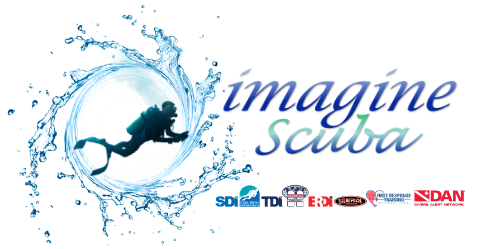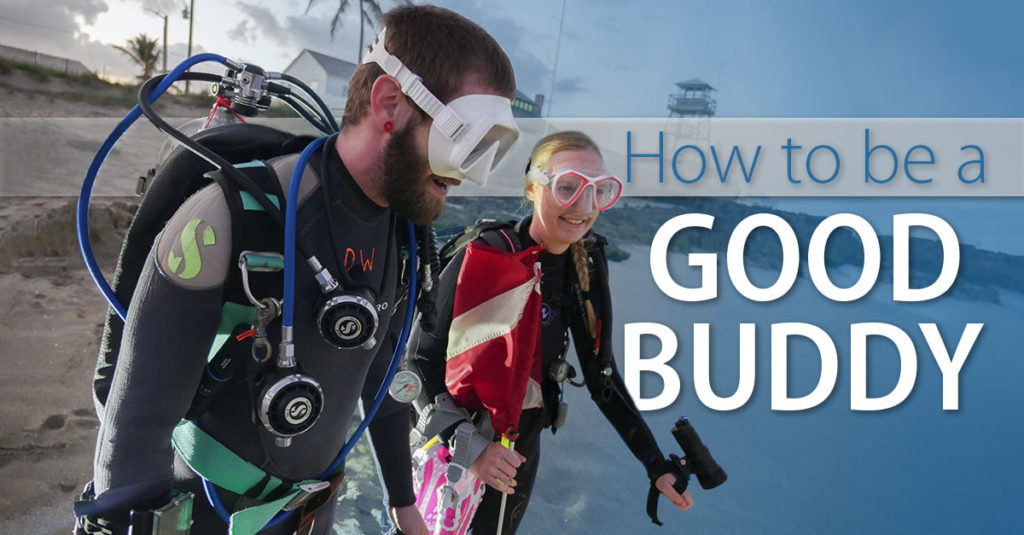We all want to be good divers, and part of being a good diver is being a good buddy. If you’re looking to brush up on some standard buddy skills or consider how other scuba skills can help you be a better buddy, then keep reading! We’re going to cover two fundamentals that you and your buddy should practice on every dive, and then break down two skills you can practice on any dive that will help you become a better buddy.
Buddy skill essentials
Communication: Communication is an obvious asset to any buddy team but has some special considerations when it comes to diving.
Hand Signals: Review your hand signals, and make sure you and your buddy are in agreement when it comes to what those hand signals mean. Hand signals can vary slightly across regions and diving environments, so if you are diving with a new buddy or are in a new location, review with the dive leader and your buddy how you will communicate underwater. Translating hand signals is not something you want to be grappling with mid-dive.
Dive planning: Establish your team dive plan, including navigation, gas consumption, lost buddy procedures, and your general goals for the dive. If your buddy is uncomfortable with any aspect of the dive plan, be accommodating and understanding. Pressuring your buddy into doing something they are not comfortable with can be dangerous and a disservice to both of you.
Pre-dive checks: You likely remember performing pre-dive safety checks in your Open Water Scuba Diver course and hopefully practice them before every dive. A good buddy will stay vigilant about reviewing their own gear and their buddy’s gear before getting in the water. You should know how your buddy’s gear works, where particular items like alternate air sources and cutting devices are stowed, and how to quickly access them. Your buddy should be able to do the same with your gear. This is especially important if you and your buddy are renting unfamiliar gear for a dive.
Diver skills that make you a better buddy
Buoyancy control: Good buoyancy is a skill that helps protect you from potential dangers such as entanglement and contact with hazardous marine life. Good buoyancy also protects the underwater environment, like fragile corals, from harmful contact by divers. Many divers strive to perfect their buoyancy to pursue hobbies like underwater photography or more technical disciplines like wreck diving and cave diving.
So, how can your good buoyancy make you a good buddy? First, you will be less likely to find yourself in a dangerous situation due to poor buoyancy that requires your buddy’s assistance and the possibility of them risking their own safety to help you. For example, a diver who loses control of their position in the water and suffers a painful sting or abrasion from knocking into a certain type of coral could be at risk of panic where it could be unsafe for a buddy to assist. However, should your buddy end up in this sort of situation, your good buoyancy will be critical to helping you swiftly reach your buddy and performing a controlled ascent as a team to the surface.
Situational Awareness: Situational awareness is a skill that takes time and experience in the water to develop. Like good buoyancy, it is a skill that can help prevent you and your buddy from having to manage an emergency situation, but may also come to your aid should one occur. Divers with good situational awareness are constantly aware of themselves and their surroundings. If you are a new diver, it will feel like having your head on a swivel; between monitoring your own gear, gas consumption, buoyancy, navigation, other divers, marine life, boat traffic above… there’s a lot to pay attention to. But situational awareness is an invaluable skill to a buddy team. If you practice this skill on every dive, you will likely notice improvement on your response times if your buddy is trying to get your attention, awareness of your proximity to each other and the rest of the group, and ability to act more quickly in assessing a possible emergency situation and formulating a plan of action.
Situational awareness is not all about being on the alert for possible threats, though. You’re going to notice more features of the dive that you can share with your buddy. You will see kinds of marine life you never paid attention to before, different features of the reef or wreck you previously overlooked, and be better equipped to explore, appreciate, and share the underwater world with your buddy.
By Allison Van Sickle

